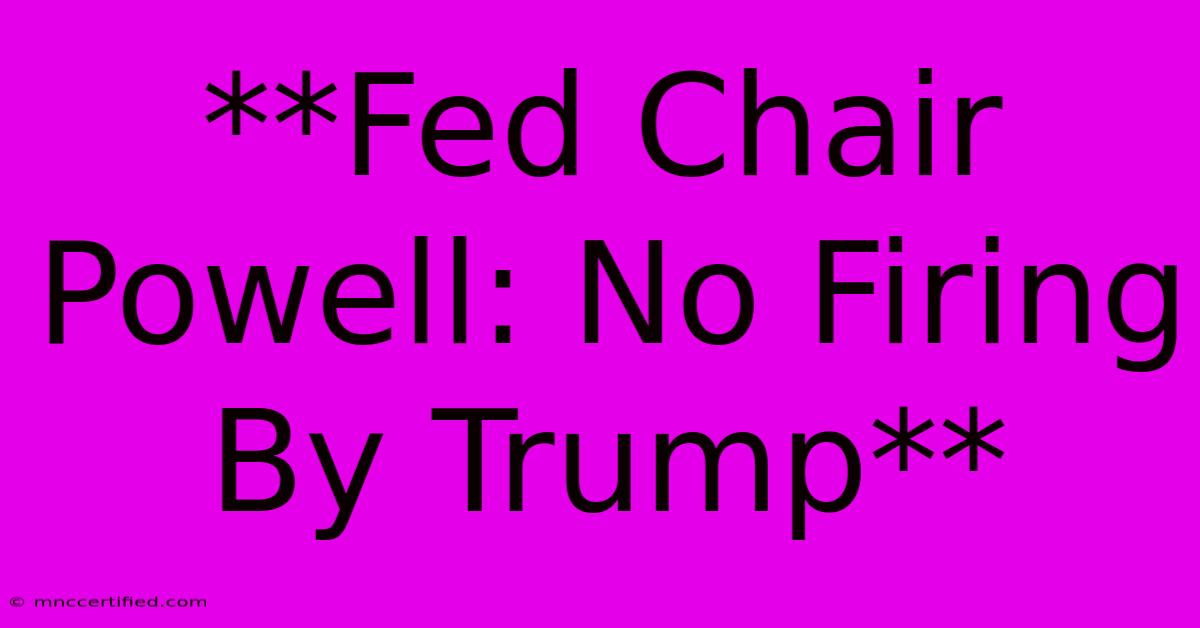**Fed Chair Powell: No Firing By Trump**

Table of Contents
Fed Chair Powell: No Firing By Trump, But Uncertainty Remains
The drama surrounding the potential firing of Federal Reserve Chair Jerome Powell by former President Donald Trump has concluded, with Powell remaining in his role. However, the episode has left a lasting mark on the relationship between the Federal Reserve and the White House, highlighting the delicate balance between political pressure and economic independence.
Background: A Tense Relationship
Trump's relationship with Powell was fraught with tension from the start. Trump publicly criticized Powell for raising interest rates, arguing that it hindered economic growth. He even went so far as to label Powell a "bonehead" for his monetary policy decisions.
This clash of personalities and policy views fueled speculation about a potential firing. Trump, known for his impulsive nature and disregard for institutional norms, was seen as someone who wouldn't hesitate to remove Powell if he felt it was necessary.
The Firing That Wasn't: A Moment of Stability?
Despite Trump's public grievances, he ultimately decided against firing Powell. This decision was likely influenced by several factors:
- Economic Stability: The US economy was performing relatively well at the time, despite Trump's constant criticism. Firing Powell could have sent shockwaves through financial markets, jeopardizing the stability Trump was keen on showcasing.
- Political Fallout: Removing Powell would have been a highly controversial move, even within the Republican party. It could have backfired politically, alienating moderate voters and potentially damaging Trump's re-election chances.
- Legal Constraints: While Trump could have technically fired Powell, doing so would have faced legal challenges. Powell's term was set to expire in 2022, and removing him before that could have been seen as an abuse of power.
The Lasting Impact: A Shadow of Uncertainty
While Trump didn't fire Powell, his actions left a significant scar on the Federal Reserve's independence. The constant pressure and public attacks undermined the Fed's ability to operate without political influence. This uncertainty, coupled with Trump's penchant for breaking norms, created a climate of anxiety and unpredictability for the financial markets.
The episode also highlighted the importance of protecting the Federal Reserve's independence. It's a crucial institution responsible for maintaining price stability and promoting economic growth. Political interference can significantly jeopardize its ability to fulfill these crucial roles.
Looking Ahead: A New Chapter Under Biden
The election of Joe Biden marked a shift in the relationship between the White House and the Federal Reserve. Biden has expressed respect for the Fed's independence and has made it clear that he believes in the institution's expertise. This change in tone has calmed the waters somewhat, but the underlying tension remains.
The Federal Reserve's independence is a delicate issue, and it will continue to be a subject of debate and scrutiny. It's crucial to ensure that the Fed can operate freely, guided by economic principles and not political pressure. The future of the US economy hinges on its ability to do so.
Keywords: Fed Chair Powell, Trump, firing, Federal Reserve, independence, monetary policy, economic stability, political pressure, Biden

Thank you for visiting our website wich cover about **Fed Chair Powell: No Firing By Trump**. We hope the information provided has been useful to you. Feel free to contact us if you have any questions or need further assistance. See you next time and dont miss to bookmark.
Featured Posts
-
Shock Move Coventry City Parts Ways With Striker
Nov 08, 2024
-
Van Nistelrooy Future Uncertain Post Man Utd Victory
Nov 08, 2024
-
Good Questions To Ask Investment Bankers
Nov 08, 2024
-
Cost Of Hernia Surgery Without Insurance
Nov 08, 2024
-
Health Insurance For Transplant Patients
Nov 08, 2024